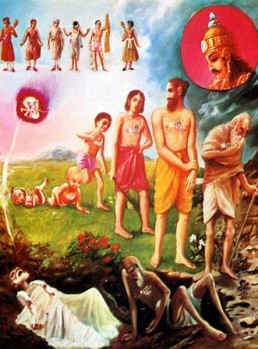Swami Chinmayananda Commentary
It is a wonderful simile that is used here, fully applicable in the context in which it is used. So long as there is no flood, everyone from the vicinity will have to reach the well to collect drinking water, although everywhere there is a vein of water running under our feet, but separated from us by the crust of the earth. For the seeker, the Veda is the only source of True Knowledge, and every one must necessarily go to the Sacred Book for Knowledge. But when the area is flooded and the wells and the tanks have disappeared in the spread of the flood, at that time the reservoir of water, which used to be of service, becomes merged in the spread of water that lies all round.
Similarly, the Vedas, meaning here “the ritualistic portion,” which promises fulfilment of the various desires, can be useful only so long as the individual is riddled with delusory desires for sensuous satisfactions. But, to a sincere student and seeker (Brahmana) who has “come to experience the Self” (Vijanatah) these ritualistic portions of the Vedas become useless inasmuch as the benefits that they can give are comprehended in the perfection that he has come to live.
The Karma Kanda only prescribes rituals for the satisfaction of desires whereby the individuals can gain some finite joy, maybe here, or in the hereafter. Thus, on discovering the Self in oneself, the seeker comes to experience the infinite bliss of the Divine, and all the pleasures derived from the performance of work enjoined in the Vedas are comprehended in the Bliss, which the realised soul experiences as the very Essence of his own Self. Everyone must admit that all those limited “satisfactions” are comprehended in the Infinite Bliss of the experience of the Self.
This does not mean that Vyasa is ignoring or ridiculing the Karma Kanda of the Vedas as such. The whip of the Cowherd Boy is descending upon the bare backs of the unintelligent, who have mistaken the means for the goal, and who consider that through ritualism and its promised joys, the Supreme or the Infinite can be gained. Karma, when undertaken with no anxiety for the results, integrates the personality; when a heart is thus purified, a clearer discriminative power comes to play through it, and in its light, Truth becomes self-evident. Having once realised the Infinite-Self spreading out all round without dimensions or frontiers, thereafter, the limited satisfaction promised by ritualism has no more any charm for the man-of-Knowledge, the Self-realised.
The Knowledge the Veda indicates is comprehended in Pure Knowledge, which is the nature of the Self. So long as the ego exists it craves for the blessings of the Vedas; when the ego has ended, the Self, in Its Infinite Divinity is capable of blessing even the Veda. A student of mathematics, having successfully passed his post-graduate course, need not read the arithmetic table, since his greater knowledge comprehends this elementary study.
AND AS FOR YOU:
Adi Sankara Commentary
If there be no need for the infinite results of all the rites and duties mentioned in the Vedas, then why should they be performed as a dedication to God? Listen to the answer being given: In the world, yavan, whatever; arthah, utility, use, like bathing, drinking, etc.; one has udapane, in a well, pond and other numerous limited reservoirs; all that, indeed, is achieved, i.e. all those needs are fulfilled to that very extent; sampluhtodake, when there is a flood; sarvatah, all arount. In a similar manner, whatever utility, result of action, there is sarvesu, in all; the vedesu, Vedas, i.e. in the rites and duties mentioned in the Vedas; all that utility is achieved, i.e. gets fulfilled; tavan, to that very extent; in that result of realization which comes brahmanasya, to a Brahmana, a sannyasin; vijanatah, who knows the Reality that is the supreme Goal — that result being comparable to the flood all around. For there is the Upanisadic text, ‘…so all virtuous deeds performed by people get included in this one…who knows what he (Raikva) knows…’ (Ch. 4.1.4). The Lord also will say, ‘all actions in their totality culminate in Knowledge’ (4.33). [The Commentators quotation from the Ch. relates to meditation on the qualified Brahman. Lest it be concluded that the present verse relates to knowledge of the qualified Brahman only, he quotes again from the Gita toshow that the conclusion holds good in the case of knowledge of the absolute Brahman as well.] Therefore, before one attains the fitness for steadfastness in Knowledge, rites and duties, even though they have (limited) utility as that of a well, pond, etc., have to be undertaken by one who is fit for rites and duties.
The Bhagavad Gita with the commentary of Sri Sankaracharya – Translated by Alladi Mahadeva Sastry
Holy Geeta – Commentary by Swami Chinmayananda
The Bhagavad Gita by Eknath Easwaran – Best selling translation of the Bhagavad Gita
The Bhagavad Gita – Translation and Commentary by Swami Sivananda
Bhagavad Gita – Translation and Commentary by Bhaktivedanta Swami Prabupadha
Srimad Bhagavad Gita Chapter 2 – Verse 46 – 2.46 yavan artha – All Bhagavad Gita (Geeta) Verses in Sanskrit, English, Transliteration, Word Meaning, Translation, Audio, Shankara Bhashya, Adi Sankaracharya Commentary and Links to Videos by Swami Chinmayananda and others – 2-46

